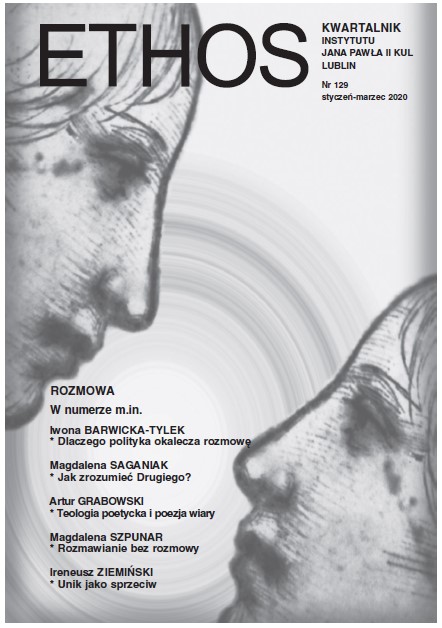Myślenie (cogito) czy poznanie (cognosco)? Tomistyczna epistemologia w sercu etyki Tadeusza Stycznia
Thinking (cogito) or Knowing (cognosco)? Thomistic Epistemology at the Heart of the Ethics of Tadeusz Styczeń
Author(s): Piotr DuchlińskiSubject(s): Epistemology, Ethics / Practical Philosophy, Contemporary Philosophy
Published by: Katolicki Uniwersytet Lubelski Jana Pawła II - Instytut Jana Pawła II, Wydział Filozofii
Keywords: ethics; Polish ethics; Tadusz Styczeń; knowledge; Thomism; personalism; dignity; human nature; values; moral facts;
Summary/Abstract: In my commentary on the paper “Być osobą to przekraczać siebie: O antropologii Karola Wojtyły” [To Be Oneself is to Transcend Oneself: On the Anthropology of Karol Wojtyła], I reconstruct the epistemic assumptions taken over by Tadeusz Styczeń from the Thomistic scholarly tradition as it developed within the milieu of the Lublin School of Philosophy. In particular, I focus on the tradition’s core assumption emphasizing the difference between cogito and cognosco. Styczeń adopted this distinction as an epistemological foundation of his ethical theory, which made it possible for him to formulate specific (epistemological and metaphysical) theses concerning the nature of both normativity in general and moral obligation in particular. Following my reconstruction of Styczeń’s views, I formulate some polemical remarks by claiming that his rationale for adopting a certain image of the world is a condition for accepting, on the one hand, epistemological theses on the primacy of cognosco over cogito and, on the other hand, ethical theses concerning the structure of our knowledge of the normative position of the human person. Based on these analyses, I claim that moral facts influence our acceptance of ethical theories only to a limited extent. Instead, acceptance of an ethical theory is above all determined by our world-picture whose heuristic function consists in that it suggests which facts to accept and which to reject, which facts are obvious and which are not, or which facts can be known by means of an intuitive insight and which must be derived from other facts. Finally, I point out that the acceptance of a specific world-view is often associated with the so-called ‘epistemic conservatism.’
Journal: Ethos. Kwartalnik Instytutu Jana Pawła II KUL
- Issue Year: 33/2020
- Issue No: 1
- Page Range: 383-409
- Page Count: 27
- Language: Polish
- Content File-PDF

